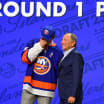For the Vegas Golden Knights to defeat the Washington Capitals and win the Stanley Cup to put the exclamation mark on their inaugural season, they will need continued elite goaltending from Marc-Andre Fleury, strong defensive play, good discipline, and some additional secondary scoring.
Let's examine the underlying numbers behind each of these requirements. Game 1 of the best-of-7 series is at Vegas on Monday (8 p.m. ET; NBC, CBC, SN, TVAS).
Golden Knights need Fleury, defensive commitment to win Stanley Cup
Underlying numbers suggest goaltender, strong play in own zone keys to defeating Capitals in Final

© David Lipnowski/Getty Images

















